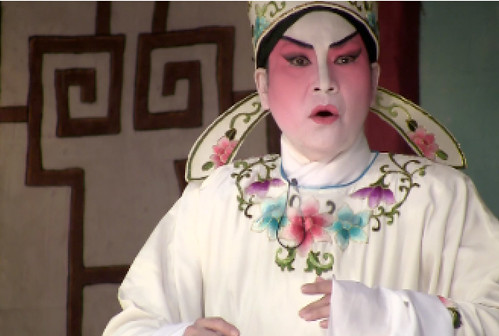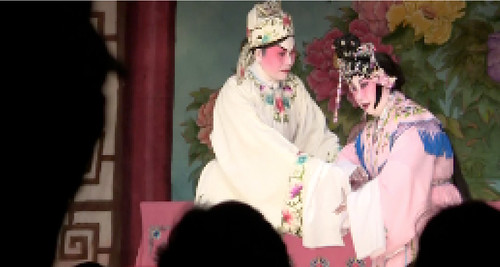NEW YORK — Amateur street singers continue to preserve the art of Cantonese Opera with their annual performance for the elderly in Chinatown.
It’s 9:30 a.m. and Si-Lian Ling, 59, is backstage piling make-up on her face. She and nine other Cantonese Opera singers from the Street Musical Club are three hours away from their performance in the main hall of the Chinese Progressive Association, where they are expecting more than 300 people. They practice every weekend at the north entrance of Columbus Park. And once a year, these street performers will entertain the elderly in traditional Cantonese Opera style — on a proper stage in full costume and make-up.
“It’s not about being a professional or novice performer,” said Ling, a Hong Kong immigrant and opera singer for eight years. “It’s about entertaining the elderly.”
Cantonese Opera originated from Southern China, where the dialect is most prominent. In 2009, it became a part of UNESCO’s list of Intangible Cultural Heritage of Humanity. Since the inscription, Hong Kong’s Home Affairs Bureau deployed $30 million to promote the study and preservation of the art form.
The opera plays are usually 30 minutes long. They contain didactic songs about romantic entanglements of Chinese historical characters. The majority of performers are women, who play female leads and impersonate male counterparts. It requires performers to observe detailed make-up, costumes and mannerisms.
Performers paint their faces in white and pink, and wear grandiose headgear. Men have thick black eyebrows that extend to the temples and a decorative helmut; while women have crystal-encrusted jewelry on their jet-black wigs and tapered sideburns that frame the face.
“I’ll look like a handsome man after make-up and costume,” said Ling, who’s been playing male roles for the past eight years. “Audiences will laugh if we put anything on incorrectly,” she added.
It takes two hours for Ling to finish her make-up, and another hour for her masculine transformation. After wrapping her chest with fabric, she wears an oversized white inner robe to conceal her feminine figure. Her stage partner Yu-Qing Liu, 60, helps her with an embroidered and sequined outer robe, inspecting the costume to ensure the inner robe doesn’t show when she’s gesturing.
“There are lots of hand movements to remember,” said Liu, a street performer for six years and first time performer on stage as a female lead.
Liu learns and chooses the appropriate poses for each character. There’s an emotional movement for every prose. If she forgets, she covers up her mistakes with a similar hand gesture. “It’s very challenging,” she said.
When Liu was a child in Hong Kong, she remembers listening to Cantonese Opera on local radio stations. She migrated to New York with her husband more than 20 years ago and worked as a hairdresser. After she retired, she took private opera lessons in Chinatown. She met Ling and the opera troupe during their practice sessions in the park, and decided to sing with them. Despite years of experience collectively, they consider themselves amateur singers. Professional performers typically start the craft at a young age. The audience, however, thinks otherwise.
“They look very professional today,” said Zi-Wai Tsui, 55, an immigrant from Guangdong. Whenever Tsui is homesick, he goes to the park and listens to them. He added: “The music reminds me of home.”
The nostalgia of home within the elderly audience drives Ling to perform. Even though she’s just a novice, she feels that it also renews her own life and makes her feel young again.
“Every weekend the elderly have nothing to do,” said Ling, “But I see they’re happy when they hear us sing.”



